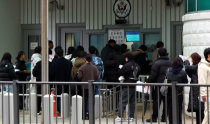KEF, First Analysis of Policy Promise of Presidential Candidates
KEF, First Analysis of Policy Promise of Presidential Candidates
Posted December. 11, 2002 22:31,
As the results of an analysis of a policy promise of three presidential candidates, Korea Employers Federation (KEF) evaluated that Lee Hoi-chang(presidential candidate of the Grand National Party) showed an economy-centric propensity focused on the economic growth, Roh Moo-Hyun(presidential candidate of the Democratic Party) showed a distribution-centric propensity focused on a social integration and Kwon Young-Gil(presidential candidate of the Democratic Labor Party) showed a labor-centric propensity focused on the labor level.
KEF evaluated and announced the policy promise of presidential candidates by four sectors of the economy, labor, and welfare and others in data of comparative analysis of the major presidential candidates policy promise of 80 pages distributed to nationwide 4,000 membership companies at that day. It is the first time that economic organizations announce the evaluation on the policy promise of the presidential candidates.
KEF evaluated that the economic policy promise of Mr. Lee will be mostly helpful for a facilitation of the company activities. KEF said that Mr. Lee focused on facilitating the company activities through the economic policy based on the market principles such as a de-regulation and decrease of the corporation tax and increasing an efficiency of public companies in taking the maximum market functions and minimizing the governments intervention.
KEF said that Mr. Roh emphasized on the social solidarity and an acknowledgement of the government intervention, and focused on the problem-solving through the governments intervention not by a pure market principle. So, the KEF insisted that his policy promise is insufficient in the supports and facilitation of the company activities.
Also, KEF evaluated that Mr. Gwon indicated a strong refusal on the market economic principle such as the strengthening of the large company regulation, establishment of wealth tax and an objection of privatization, his policy promise was close to the economic ideology of progressive socialism.
KEF said that there were many similarities between the policy promise of Mr. Lee and policy promise of Mr. Roh. And some policy promises are doubtful on a realization functionality and consistency.
In particular, KEF said, The policy promise of Mr. Gwon doesnt have the realization possibility because they are intransigent and anti-realistic. It was clearly in the position of the objection against Mr. Gwon.
KEF said, The policy promises are based on contents of the policy promises book officially published their own party and include substances spoken by the presidential candidates through TV discussion. The data give helps to people in judging which candidate can contribute to the company and national development through improvement of the market economy.
Joong-Hyun Park sanjuck@donga.com







